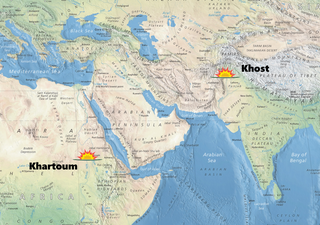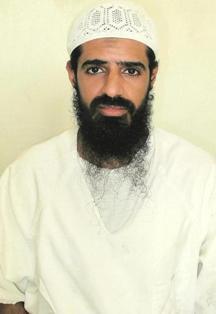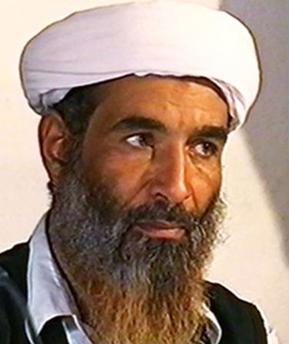
Al-Qaeda is a pan-Islamist militant organization led by Sunni Jihadists who self-identify as a vanguard spearheading a global Islamist revolution to unite the Muslim world under a supra-national Islamic state known as the Caliphate. Its members are mostly composed of Arabs, but also include other peoples. Al-Qaeda has mounted attacks on civilian, economic and military targets of America and its allies; such as the USS Cole bombing, 1998 US embassy bombings and the September 11 attacks. The organization is designated as a terrorist group by NATO, UN Security Council, the European Union, and various countries around the world.
The following timeline is a chronological list of all the major events leading up to, during, and immediately following the September 11 attacks against the United States in 2001, through the first anniversary of the attacks in 2002.

Khalid Sheikh Mohammed, often known by his initials KSM, is a Pakistani terrorist and the former Head of Propaganda for al-Qaeda. He is currently held by the United States at the Guantanamo Bay detention camp under terrorism-related charges. He was named as "the principal architect of the 9/11 attacks" in the 2004 9/11 Commission Report.

Saif al-Adel is an Egyptian former special forces officer and explosives expert who is widely considered to be the de facto leader of al-Qaeda. A founding member of the group, he was previously a member of its governing Shura council and had headed its military committee since 2001. "Saif al-Adel", which translates literally as "sword of justice", is the pseudonym of a former colonel in Egypt's El-Sa'ka Force commandos during the 1980s. His real name is Mohamed Salah al-Din Zaidan.

Operation Infinite Reach was the codename for American cruise missile strikes on al-Qaeda bases that were launched concurrently across two continents on 20 August 1998. Launched by the U.S. Navy, the strikes hit the al-Shifa pharmaceutical factory in Khartoum, Sudan, and a camp in Khost Province, Afghanistan, in retaliation for al-Qaeda's August 7 bombings of American embassies in Kenya and Tanzania, which killed 224 people and injured over 4,000 others. Operation Infinite Reach was the first time the United States acknowledged a preemptive strike against a violent non-state actor.

Walid Muhammad Salih bin Mubarak bin Attash is a Yemeni prisoner held at the United States' Guantanamo Bay detention camp under terrorism-related charges, and is suspected of playing a key role in the early stages of the 9/11 attacks. The Office of the Director of National Intelligence has described him as a "scion of a terrorist family". American prosecutors at the Guantanamo military commissions allege that he helped in the preparation of the 1998 East Africa Embassy bombings and the USS Cole bombing and acted as a bodyguard to Osama bin Laden, gaining himself the reputation of an "errand boy". He is formally charged with selecting and helping to train several of the hijackers of the September 11 attacks.

Ahmed Saïd Khadr was an Egyptian-Canadian philanthropist with alleged ties to al-Qaeda in Afghanistan and Pakistan. His activity in Afghanistan began in response to the Soviet invasion of Afghanistan in 1979, and he has been described as having had ties to a number of militants within the Afghan mujahideen, including Saudi militant Osama bin Laden. Khadr was accused by Canada and the United States of being a "senior associate" and financier of al-Qaeda in Afghanistan.
Jamal Ahmed al-Fadl is a Sudanese militant and former associate of Osama bin Laden in the early 1990s. Al-Fadl was recruited for the Afghan war through the Farouq mosque in Brooklyn. In 1988, he joined Al-Qaeda and took an oath of fealty to Bin Laden. After a dispute with Bin Laden, al-Fadl defected and became an informant to the United States government on al Qaeda activities.
On September 11, 2001, 19 al-Qaeda terrorists took control of four commercial aircraft and used them as suicide weapons in a series of four coordinated acts of terrorism to strike the World Trade Center in New York City, The Pentagon in Arlington County, Virginia, and an additional target in Washington, D.C. Two aircraft hit the World Trade Center while the third hit the Pentagon. A fourth plane did not arrive at its target, but crashed into a field in Pennsylvania after a passenger revolt. The intended target is believed to have been the United States Capitol. As a result, 2,977 victims were killed, making it the deadliest foreign attack on U.S. soil, exceeding Japan's surprise attack on Pearl Harbor in Honolulu, Hawaii, on December 7, 1941, which killed 2,335 members of the United States Armed Forces and 68 civilians. The effort was carefully planned by al-Qaeda, which sent 19 terrorists to take over Boeing 757 and Boeing 767 aircraft, operated by American Airlines and United Airlines.
The Khalden training camp was one of the oldest and best-known military training camps in Afghanistan. It was located in the mountains of eastern Paktia Province, near to Tora Bora.
The Battle of Jaji was fought during the Soviet–Afghan War between Soviet Army units, and their allies of the Democratic Republic of Afghanistan against Maktab al-Khidamat in Paktia Province. This battle occurred in May 1987, during the first stage of withdrawal of Soviet forces from Afghanistan. The objective was to relieve a besieged garrison at Ali Sher, and cut off supply lines to the Mujahideen from Pakistan. The battle is primarily known for the participation of the Arab foreign fighter and future founder of Al Qaeda, Osama bin Laden, who acquired his reputation as a divine jihadist warrior as a result of the Mujahideen victory during this battle. Bin Laden led a group of some 50 Arab foreign fighters during this battle, of which at least 13 were killed in action.

Mamdouh Mahmud Salim is a Sudanese co-founder of the Islamist terrorist network al-Qaeda. He was arrested on 16 September 1998 near Munich. On 20 December 1998, he was extradited to the United States, where he was charged with participating in the 1998 United States embassy bombings.

The Bin Laden Issue Station, also known as Alec Station, was a standalone unit of the Central Intelligence Agency in operation from 1996 to 2005 dedicated to tracking Osama bin Laden and his associates, both before and after the 9/11 attacks. It was headed initially by CIA analyst Michael Scheuer and later by Richard Blee and others.
Abu Ubaidah al-Banshiri was the nom de guerre of Ali Amin al-Rashidi, was a founding member of al-Qaeda and served as the groups first military commander. He was known within the group as the "most capable and popular leaders"
Mahfouz Ould al-Walid, kunya Abu Hafs al-Mauritani, is a Mauritanian Islamic scholar and poet previously associated with al-Qaeda. A veteran of the Soviet–Afghan War, he served on al-Qaeda's Shura Council and ran a religious school called the Institute of Islamic Studies in Kandahar, Afghanistan, from the late 1990s until the American invasion of Afghanistan in 2001.
Carried out by the Egyptian Islamic Jihad, the 19 November 1995 attack on the Egyptian embassy in Islamabad, Pakistan was retaliation against the diplomatic staffers who were accused of gathering intelligence on Jihad factions inside Pakistan. It was the deadliest attack against the Egyptian government, since it had been declared apostate three years earlier by Islamic militants.
L'Houssaine Kherchtou was an early initiate in al-Qaeda, joining the militant group in 1991. In 2000, he pleaded guilty to conspiracy to murder, but as he was the chief witness against four of his former colleagues, all of whom were subsequently sentenced to life imprisonment, his charges were withdrawn and he entered the witness protection program.
Mustafa Hamid, also known as Abu Walid al-Masri and Hashim al-Makki, is a journalist who in the 1980s fought as an Islamic jihad volunteer during the Soviet–Afghan War. He is reported to have been an al-Qaeda advisor and taught at the Al Farouq training camp in the 1990s. He served as a bureau chief in Afghanistan for Al Jazeera from 1998–2001, before leaving for Iran.
Khalid is a popular Arabic male given name meaning "eternal, everlasting, immortal". It also appears as a surname.

Mohammed Atef was the prominent military chief of al-Qaeda, and a deputy of Osama bin Laden, although Atef's role in the organization was not well known by intelligence agencies for years. He was killed in a US airstrike in November 2001.









